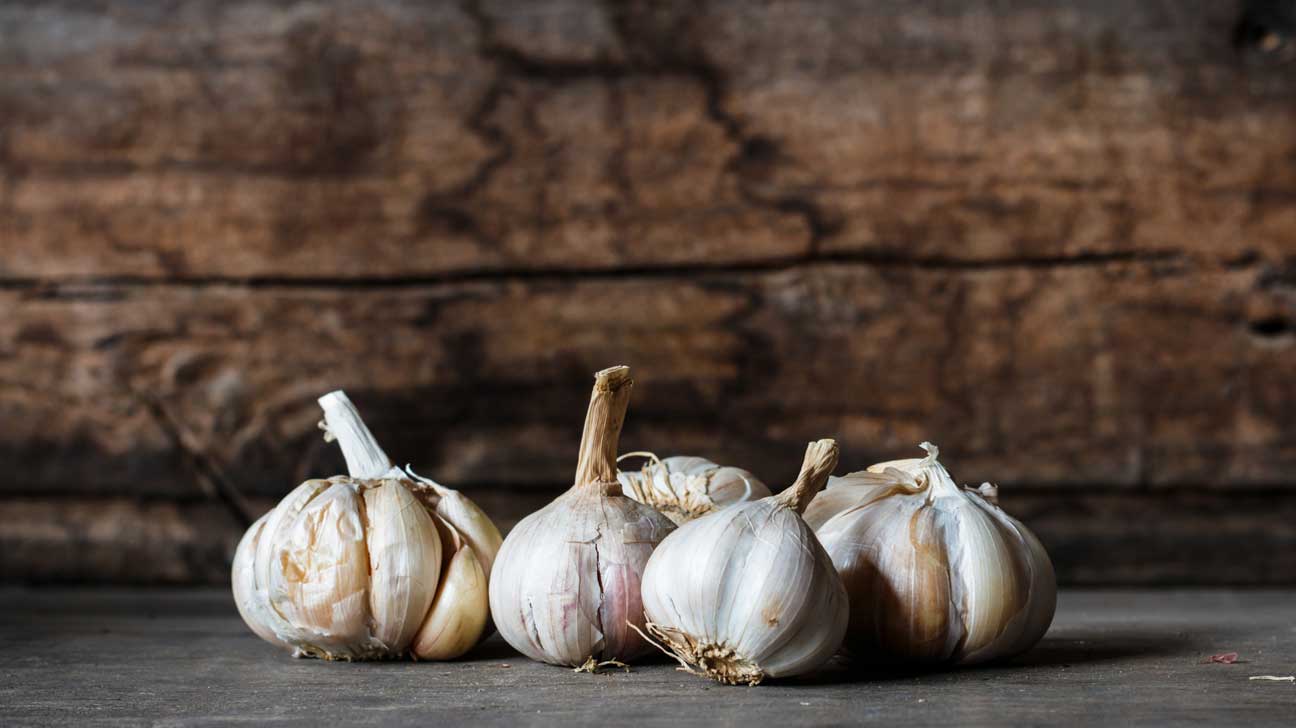1. Garlic Contains a Compound Called Allicin, Which Has Potent Medicinal Properties
 Garlic is a plant in the Allium (onion) family.
Garlic is a plant in the Allium (onion) family.
It is closely related to onions, shallots and leeks.
It grows in many parts of the world and is a popular ingredient in cooking due to its strong smell and delicious taste.
However, throughout ancient history, the main use of garlic was for its health and medicinal properties (1).
Its use was well documented by all the major civilizations... including the Egyptians, Babylonians, Greeks, Romans and the Chinese (2).
The entire "head" is called a garlic bulb, while each segment is called a clove. There are about 10-20 cloves in a single bulb, give or take.
We now know that most of the health effects are caused by one of the sulfur compounds formed when a garlic clove is chopped, crushed or chewed.
This compound is known as allicin, and is also responsible for the distinct garlic smell.
Allicin enters the body from the digestive tract and travels all over the body, where it exerts itspotent biological effects (which we'll get to in a bit).
2. Garlic Is Highly Nutritious, But Has Very Few Calories
[/h]Calorie for calorie, garlic is incredibly nutritious.
A 1 ounce (28 grams) serving of garlic contains (3):
This is coming with 42 calories, with 1.8 grams of protein and 9 grams of carbs.
[h=2]
3. Garlic Can Combat Sickness, Including the Common Cold
[/h]Garlic supplementation is known to boost the function of the immune system.
One large 12-week study found that a daily garlic supplement reduced the number of colds by 63% compared with placebo (4).
The average length of cold symptoms was also reduced by 70%, from 5 days in placebo to just 1.5 days in the garlic group.
Another study found that a high dose of garlic extract (2.56 grams per day) can reduce the number of days sick with cold or flu by 61% (5).
If you often get colds, then adding garlic to your diet could be incredibly helpful.
[h=2]
[/h]

It is closely related to onions, shallots and leeks.
It grows in many parts of the world and is a popular ingredient in cooking due to its strong smell and delicious taste.
However, throughout ancient history, the main use of garlic was for its health and medicinal properties (1).
Its use was well documented by all the major civilizations... including the Egyptians, Babylonians, Greeks, Romans and the Chinese (2).
The entire "head" is called a garlic bulb, while each segment is called a clove. There are about 10-20 cloves in a single bulb, give or take.
We now know that most of the health effects are caused by one of the sulfur compounds formed when a garlic clove is chopped, crushed or chewed.
This compound is known as allicin, and is also responsible for the distinct garlic smell.
Allicin enters the body from the digestive tract and travels all over the body, where it exerts itspotent biological effects (which we'll get to in a bit).
BOTTOM LINE:Garlic is a plant in the onion family, grown for its cooking properties and health effects. It is high in a sulfur compound called Allicin, which is believed to bring most of the health benefits.
[h=2]2. Garlic Is Highly Nutritious, But Has Very Few Calories
[/h]Calorie for calorie, garlic is incredibly nutritious.
A 1 ounce (28 grams) serving of garlic contains (3):
- Manganese: 23% of the RDA
- Vitamin B6: 17% of the RDA
- Vitamin C: 15% of the RDA
- Selenium: 6% of the RDA
- Fiber: 0.6 gram
- Decent amounts of calcium, copper, potassium, phosphorus, iron and vitamin B1
This is coming with 42 calories, with 1.8 grams of protein and 9 grams of carbs.
BOTTOM LINE:Garlic is low in calories and very rich in Vitamin C, Vitamin B6 and Manganese. It also contains trace amounts of various other nutrients.
[h=2]
3. Garlic Can Combat Sickness, Including the Common Cold
[/h]Garlic supplementation is known to boost the function of the immune system.
One large 12-week study found that a daily garlic supplement reduced the number of colds by 63% compared with placebo (4).
The average length of cold symptoms was also reduced by 70%, from 5 days in placebo to just 1.5 days in the garlic group.
Another study found that a high dose of garlic extract (2.56 grams per day) can reduce the number of days sick with cold or flu by 61% (5).
If you often get colds, then adding garlic to your diet could be incredibly helpful.
BOTTOM LINE:Garlic supplementation helps to prevent and reduce the severity of common illnesses like the flu and common cold.
ADVERTISING
[h=2]
[/h]
